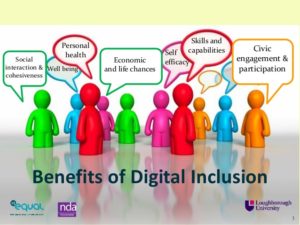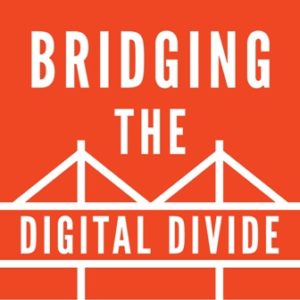Wandsworth can be the most digital inclusive borough in London by 2024!
The Coronavirus pandemic and subsequent lockdown has exposed many troubling issues that were previously hidden below the water line. One of which is digital exclusion. This short article sets out some of the issues and proposes a way forward for our community in Wandsworth.
Case Study 1: A family struggling with their education
Samira is a single mother of 3 children, aged 12, 10 and 8. The family live on a low income, in a flat in Battersea. Prior to the Covid-19 crisis Samira worked part-time, but she lost her job the week after lockdown. Her eldest has severe developmental and physical disabilities and he is often in and out of hospital. Her youngest has ADHD and struggles with his behaviour at school.
The family have two mobile phones which they share. They do not have a laptop. Samira is a refugee and unable to read or write in English herself. She struggles to help her children with their school work. The family does not have WiFi. They rely on the phone’s internet data, which is expensive and can be temperamental. As a result, the children’s education has been severely affected during this lockdown, as they hardly ever do their school work.
Issues
Up to 10% or 5.3m adults in the UK are digitally excluded (gov.uk digital exclusion strategy 2018). They lack internet access to healthcare, education, shops and more online; lack IT hardware; have low levels of digital literacy; and/or the ability to pay for online access.
Digital exclusion involves the unequal access and capacity to use information and communication technologies (ICTs) that are seen as essential to fully participate in society (Schejter et al 2015).
About 8% of people in the UK (4.3m people) were estimated to have zero basic digital skills in 2018 (see Appendix 1). In 2016 it was estimated that within the next 10 to 20 years, 90% of jobs will require some sort of digital skills. The Good Things Foundation states that ‘providing everyone in the UK with the essential digital skills they need by 2028 will lead to a benefit of £15 for every £1 invested, and a net present value of £21.9 billion’.
There is a lack of quantitative data about the extent and nature of digital exclusion in Wandsworth. However, during the Covid-19 lockdown, many statutory agencies, schools, community groups and charities and local residents have highlighted that digital exclusion, in all its guises, is a significant issue within the borough.

Digital inclusion is a social issue
A lack of digital skills and access can have a huge negative impact on a person’s life, leading to
- poorer health outcomes and a lower life expectancy
- increased loneliness and social isolation
- less access to jobs and education.
It can mean
- paying more for essentials
- financial exclusion
- an increased risk of falling into poverty.
Digitally excluded people also lack a voice and visibility in the modern world, as government services and democracy increasingly move online.
What’s more, it’s those already at a disadvantage – through age, education, income, disability, or unemployment – who are most likely to be missing out, further widening the social inequality gap.
Case Study 2: Digital exclusion impacting on education and finances
The Ali family have four children, aged 12, 17, 19, 21, all living at home, in Battersea. Their mother works part-time, as do the two oldest. Universal Credit makes up the shortfall. When applying for Universal Credit, she did not have the digital skills to do this but was lucky to receive assistance from Wandsworth Citizens Advice.
The two oldest are studying at university. The 17-year-old is in 6th form, and the youngest is moving into Year 7. They could only afford to buy one laptop for the children to study, (in payments and they’re still paying 2 years on) but this device has to be shared between all 4 siblings. The mother is also studying English and Maths at Katherine Low Settlement. She only has a smartphone to access all her lessons in the lockdown.
So what can we do?
Objective
Our ambition is that by 2024 Wandsworth will be the most digitally inclusive borough in London.
How do we get there?
It will take the whole community to solve digital exclusion. So, we need to come together and develop a strategy and plan to achieve this ambition.
Who should be involved?
This will involve the Council, local businesses, charities, schools, funders and, of course, residents.
Issues to address
To achieve our ambition, we need to: 
- Ensure we have strong leadership, a partnership approach and the desire and ambition to change
- Build the evidence base and identify need
- Provide hardware and IT equipment
- Enable access through data and more
- Develop skills through training and education
- Build confidence
- Access funding and finance
- Learn from others
- Monitor, evaluate and review progress
- Celebrate success
Nest steps
We suggest that a small working group is established, by July, to scope out the issues and initial ideas for a way forward. Katherine Low Settlement is happy to convene this.
Contact
Aaron Barbour 020 7223 2845
Director [email protected]
Katherine Low Settlement www.klsettlement.org.uk